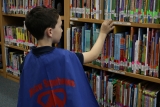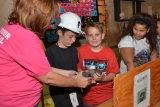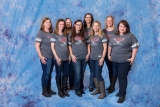-
Category 1
Selected in 2017
-
Grades: pre k - 5
School Setting: urban
Town Population: 292
Student Enrollment: 720
Student Demographics:
Black/African American: 7%
Teacher/Student Ratio: 1:24
White/Caucasian: 49%
Hispanic: 31%
Hawaiian/Pacific Islander: 0%
Asian: 5%
Native American: 0%
Other: 8%
% Reduced Lunch: 62%
% ELL Learners: 7.7%
Founded: 1953 -
PRINCIPAL:
Jennifer Furman-Born -
CONTACT:
330 Tin Street
Henderson, NV 89015
702-799-8930
0911-inbox@nv.ccsd.net
McCaw STEAM Academy Elementary School
Henderson, NV
McCaw creates a challenging data-driven environment with high expectations to ensure success for all students.
- Describe specific programs in place to ensure that families are involved in the success of your school and students.
- At McCaw, family engagement fosters positive self-regard of one’s own culture and encourages positive attitudes toward the culture of others. Assemblies, grade level guest speaker presentations, cultural videos, research projects, and global news give our students and families abundant opportunities to engage with their children and school. The use of positive role models from the local community (i.e. family) is a valuable component. In order to foster inclusion and character development we celebrate weekly kindness activities that generate an environment of acceptance and inclusion. These celebrate individual strengths, differences, encourages self-control and respect for the feelings, and rights of others through stories, play, and discussions
- Describe the most successful activity your school has initiated to strengthen ties to your community.
- Family and community engagement is a vital part of our success along with a school climate-structure that supports family involvement. Our school ensures we continue to sustain strong ties to the community by collaborating with stakeholders, sharing knowledge by asking questions and seeking solutions, and through engaging learning experiences focused around instruction and our STEAM theme. They are involved in our school plan of operation, including key information on our budget, instructional model, and data. Our stakeholders are valued and provide input and support for the expansion of science programs, exploration labs, and expanding family engagement through after-school STEAM events. Our community partners continue to grow and be sustained. It is expansive and an essential key aligned to our instructional program.
- Describe your philosophy of school change or improvement.
- As a leader, I believe in bringing a community together to share leadership and take ownership of their school, set goals, and develop a focused vision. Creating a school model provides everyone the ownership in implementing the vision and unites the school. Once the plan is in place it requires visible, hands-on monitoring through data, observations, planning, and professional development. As a leader, I believe in focusing on an individual’s strengths, valuing their expertise, gaining trust, and building-up individual confidence to develop weaker instructional areas. As you build each individual’s strengths, you begin to ask the question “what would you suggest” and encourage them to be creative to grow and develop in a safe culture. Building relationships, developing leadership in stakeholders, and focusing on school as the “hub” of the community, creates an environment where students all grow and succeed.
- What are your school’s top two goals for the next year?
- McCaw’s top two goals for the following year are to have our students academically grow by one year or more thus increasing the median growth percentiles in reading and math. Additionally, McCaw will focus on increasing the students percent proficient based off of state and national normative data in reading and math.
- What is the single most important factor in the success of your school that others could replicate?
- Through effective reading practices, McCaw presents a way to use data to drive instruction, create short, purposeful, focused lessons, and how to establish an environment of daily goal setting all facilitated through student ownership of content standards and celebrations of individual student achievements. We focus on creating data-driven lessons, spiraling standards-based grade-level instruction in short, systematic, mini-lessons. We provide engaging ways for students to have an opportunity to concentrate on newly learned concepts at their own academic level through independent reading, teacher guidance and discourse, building reading stamina, concentration and comprehension. We create student data-focused goal setting helping craft student ownership of their reading goals through specific, measurable, achievable, relevant, and timely guidelines.
- Describe the program or initiative that has had the greatest positive effect on student achievement, including closing achievement or opportunity gaps, if applicable.
- The best initiative that we implemented starts with setting a clear vision of where we need to go as a school. Following a specific instructional model, it is communicated school-wide. Teachers are consistently using data and the model to keep the focus sharp to guide and plan instruction and learn through meaningful professional development. Standards based grade-level instruction is presented in short, systematic, direct, and purposefully engaging ways. Students take ownership of setting goals enabling the teachers to act as the facilitator supporting students’ ability to attain their goal. Students articulate goals and current academic levels as well as seek support to master the objective. Once students reach a goal the celebration begins to keep students engaged and motivated. The celebrations bring positive energy and school-wide pride for all stakeholders no matter what level of accomplishment.
- Explain how Title I funds are used to support your improvement efforts.
- Title I funding is used to support the school-wide instructional model to impact all students kindergarten through fifth grade. Our funds are spent to purchase national norm-referenced software programs in the areas of reading and math in order to provide data and intervention. Professional development is provided utilizing the program data, create focused intervention plans, guide student achievement and growth, enhance differentiation, inclusionary best practices, etc. Remaining funding is used to support after-school tutoring and enrichment opportunities. Our tutoring is focused on specific student needs and delivered through engaging hands-on activities delivered in the form of project based learning.
- Identify the critical professional development activities you use to improve teaching and student learning.
- Professional development (PD) is the foundation of McCaw. Spiraling and continuous PD ensures teachers remain up-to-date on new research regarding how children learn, emerging technology tools for the classroom, new curriculum resources, and more. PD is focused, collaborative, data driven and derived from working with students. Specific examples of PD: data analysis team collaboration, goal setting and long-range team instructional planning, STEAM rotations, spatial-temporal math, number talks, project-based learning, Design Thinking Process, science strategies, and blended learning. This time provides concentrated reflection upon instructional practices and desired student benchmarks, as well as monitoring of outcomes to ensure success. Teachers collaborate on sharing successful lessons and strategies, best practices, differentiating instruction, common assessments and intervention.
- Describe how data is used to improve student achievement and inform decision making.
- McCaw creates a challenging data-driven environment with high expectations to ensure success for all students. Teachers use data daily to drive instruction, weekly to set goals, and biweekly to engage in goal tracking and yearly benchmark tracking. Teachers effectively use program and assessment data to craft mini-lessons and conference with students setting specific, measurable, achievable, relevant, and timely goals in all academic areas. McCaw facilitates student ownership of goals through teacher guidance, discourse of student learning. Students are able to articulate their personal data and purpose for learning, their goals and current academic levels, as well as seek support to master the standards. Once students reach an individualized goal, celebrations nurture the development of self-confidence, pride and love of learning!
- Describe your school culture and explain changes you’ve taken to improve it.
- McCaw creates a culture of challenging data-driven learning environment with high expectations to ensure success for every individual student. Teachers use data daily to drive instruction, weekly to set goals meeting each student’s needs, and biweekly to engage in goal tracking and yearly benchmark tracking. Teachers effectively use program and assessment data to craft mini-lessons and conference with students setting specific, measurable, achievable, relevant, and timely goals in all academic areas. McCaw facilitates student ownership of their goals through teacher guidance, discourse and building metacognition of student learning. Students are able to articulate their personal data and purpose for learning, their goals and current academic levels, as well as seek support to master the standards. Once students reach an individualized goal, special celebrations nurture the development of self-confidence, pride and love of learning!
Stats
-
Category 1
Selected in 2017
-
Grades: pre k - 5
School Setting: urban
Town Population: 292
Student Enrollment: 720
Student Demographics:
Black/African American: 7%
Teacher/Student Ratio: 1:24
White/Caucasian: 49%
Hispanic: 31%
Hawaiian/Pacific Islander: 0%
Asian: 5%
Native American: 0%
Other: 8%
% Reduced Lunch: 62%
% ELL Learners: 7.7%
Founded: 1953 -
PRINCIPAL:
Jennifer Furman-Born -
CONTACT:
330 Tin Street
Henderson, NV 89015
702-799-8930
0911-inbox@nv.ccsd.net










